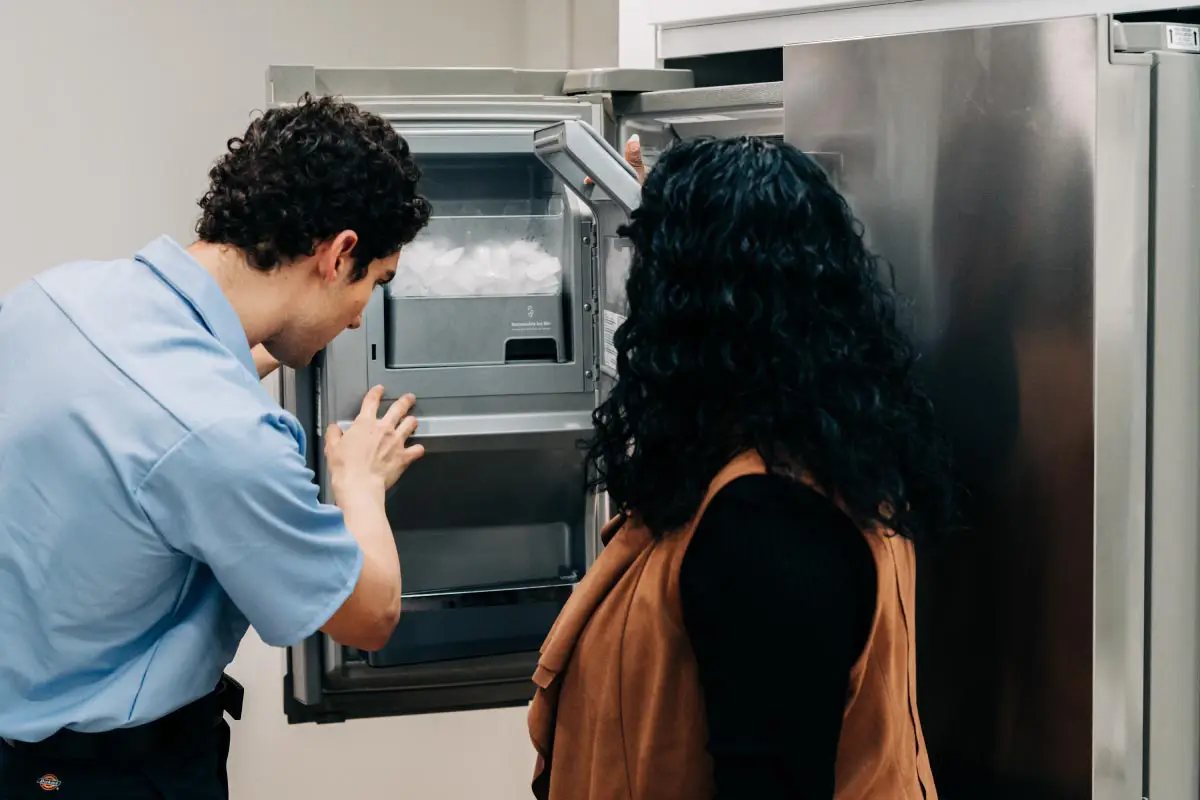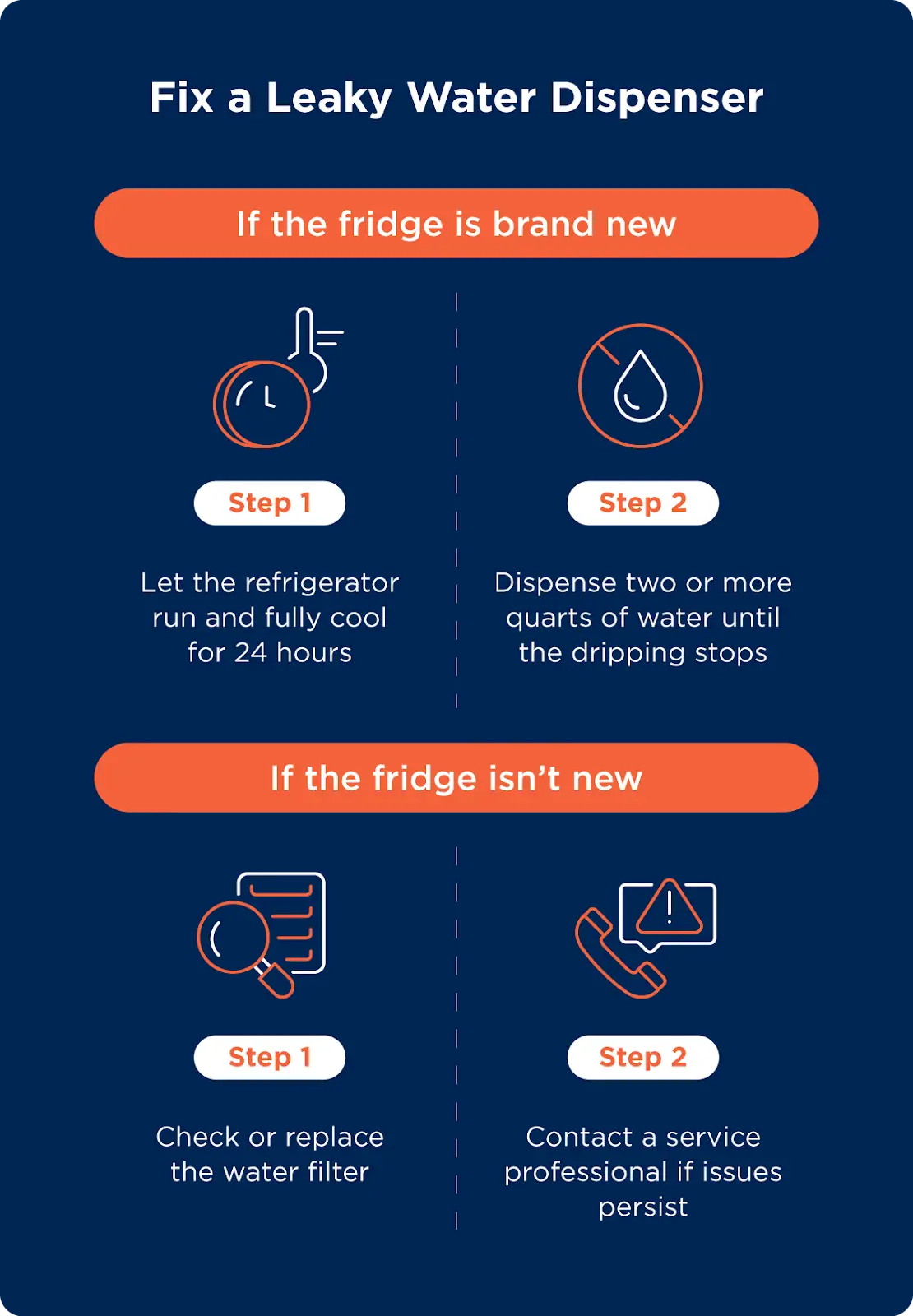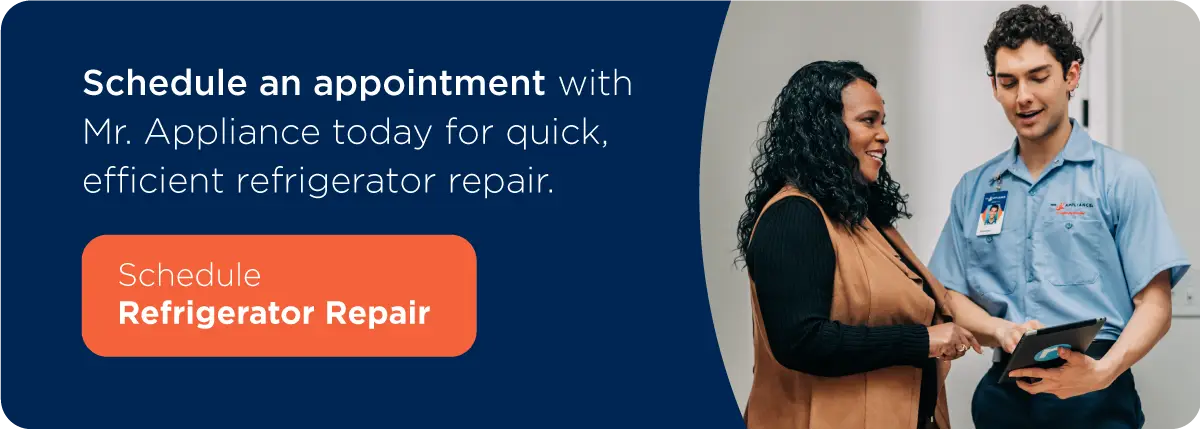Refrigerator Leaking Water? 9 Common Causes (and Solutions)

|
Common causes of refrigerator leaks include:
|
A refrigerator leaking water is an unfortunate but not uncommon event. and can be caused by several different things, including a freezer leaking into a fridge. A dirty defrost drain is also a common culprit because this component controls frost and condensation.
However, there are several other potential causes of a fridge leak, and it’s important to identify the signs and understand what to do about a refrigerant leak.
Why Is My Refrigerator Leaking Water?
The first step to solving the issue is identifying where the water is coming from. Is it dripping from the fridge ceiling? Is it pooling under the produce drawer? Unplug your fridge for safety, check various areas to see if you can identify the source of the leak. Depending on where the water is coming from, try the fixes listed below to solve the problem:
1. Blocked Condensation Drain
In most fridge models, The drain is located behind the back wall panel and not homeowner serviceable. A clog typically stems from a buildup of food, ice, dust, or other debris and can be the cause of water on the floor of the refrigerator or freezer or leaking out onto the floor.
Regularly cleaning your refrigerator can help prevent a clog, but even regular cleaning may not do the trick. You might need to contact your local Mr Appliance to fix this problem for you.
2. Frozen Water Supply Line
If your ice maker is working properly, your issue is probably elsewhere. However, if your ice maker is not making ice, check if the water supply line or valve is frozen. You may also need a professional ice machine repair service to resolve this issue, especially if it involves dealing with toxic coolant.
This issue usually occurs if your fridge needs a more involved repair. If it needs a major clean-out or there’s an issue with the coolant or another malfunction, the evaporator coils get too cold, freezing other parts of your fridge, including the supply line.
Solution:
- Look for a frozen water line.
- Defrost your fridge (see instructions below).
- Turn the temperature setting down (maintain an internal temperature of 40 degrees Fahrenheit or less).
- If you’re still unsure why you’re having issues, contact a service professional to take a look.
3. Frost Buildup
There may be too much ice buildup inside your refrigerator, which means you’ll need to defrost it. If you’ve ruled out causes like a seal issue and opening the fridge too often or for too long, there may be another cause. If too much ice builds up in your refrigerator, it will limit its ability to maintain a consistent temperature. The FDA recommends keeping your refrigerator at 40 degrees Fahrenheit or less for optimal food safety.
Solution:
- Fully defrost the refrigerator. Check out our detailed instructions on how to clean your fridge properly.
- Take everything out of your fridge and store it in another refrigerator (if you have one).
- If you don’t have a second refrigerator, place any perishable items in coolers with ice to keep them cold.
- Put down a towel to catch the water.
- Unplug the appliance for 8 to 12 hours.
- Keep a temperature sensor in your fridge to detect the proper temperature and adjust the settings as necessary to prevent future frost buildup.
4. Broken Seal
If your door gasket isn’t sealing properly, moisture may enter your fridge and cause excess condensation that pools in the fridge. In a freezer with a poor seal, you may notice frozen drips or extra freezer burn on your food and around the freezer’s interior.
Solution:
- Close the refrigerator door on a dollar bill or a piece of paper to see if you can easily pull it out. If you can, your refrigerator and/or freezer is not sealing properly, which means it’s probably time for a replacement.
- Buy the right seal for the make and model of your fridge. You can find this information in your owner’s manual or by contacting the manufacturer.
6. Broken Water Dispenser
Water dispensers may begin to leak after a recent installation or if damaged in any way. A refrigerator water dispenser leaking water is often caused by air trapped in the water line or if there’s a leak in the water line itself. Other issues, such as a broken dispenser switch, can also cause leaks, which can be fixed by a professional.
Solution:
- Let the refrigerator run for a full day.
- Dispense a couple of quarts of water.
- If the leak persists, check or replace the water filter in the refrigerator to ensure proper installation.
- If you continue to have issues, contact a service professional to investigate the problem.

7. Damaged Water Line
If your fridge has a water dispenser, it’s possible the water line is damaged, which may result in a water leak. You can also have a leaky water line if the valve is damaged or the line isn’t sealed properly. If your water bill is mysteriously high or other DIY fixes have failed, the issue could be with the water line.
Solution:
- Have an appliance expert check the water line for your refrigerator and replace the damaged line if necessary.
8. High Humidity
If your home has a high humidity level, some of this moisture will get into your fridge each time you open the refrigerator door and build up over time. This excess moisture will lower the internal temperature of your freezer and refrigerator and cause water to pool inside.
Solution:
- Unplug the fridge.
- Locate the drain pan behind the fridge. It may be behind a panel that you can remove with a screwdriver.
- Remove, empty, and clean the drain pan.
- Reinstall the drain pan and panel.
- Install a dehumidifier or refrigerator desiccant if needed.
9. Damaged Drain Pan
The drain pan holds small amounts of water until it can evaporate, but if the pan is damaged, rusted, or clogged with food and dirt, the water may drip onto the floor, which means you’ll have to clean or replace the pan.
Solution:
- Unplug the fridge.
- Locate the drain pan behind the fridge. It may be behind a panel that you can remove with a screwdriver.
- Remove, empty, and clean the drain pan.
- Inspect the drain pan for cracks or leaks.
- If needed, contact a professional to replace the pan.
- If the pan is intact, reinstall it and put the panel back in place.
Why Is the Freezer Leaking Water?
The culprit behind a freezer leaking water may not be in the fridge at all. If the freezer is leaking, the possible causes are very similar to refrigerator leaks:
- Broken drip tray
- Clogged water line
- Improper seal
- Blocked defrost drain
- Humid environment
- Damaged defroster
- Broken evaporation fan
If there’s excess ice in the appliance, you might need to defrost the freezer. If this doesn’t seem to work, you may be dealing with a faulty ice maker part, such as the temperature sensor or heating element. Replacing those parts is not a DIY project, so contact a professional for help.
Schedule Refrigerator Repair With Mr. Appliance
A leaky refrigerator is more than a nuisance to clean up — it can damage your floors or cause electrical shock if the water contacts electricity. If your refrigerator or freezer is leaking, schedule an appointment with your local Mr. Appliance experts to diagnose and fix the leak.
This article is intended for general informational purposes only and may not be applicable to every situation. You are responsible for determining the proper course of action for your home and property. Mr. Appliance is not responsible for any damages that occur as a result of this blog content or your actions. For the most accurate guidance, contact the Mr. Appliance location nearest you for a comprehensive, on-site assessment.
Refrigerator Leaking Water FAQ
Integrity, dependability, and exceptional customer service are the qualities that have made Mr. Appliance the go-to resource for appliance maintenance and repairs. All independently owned and operated Mr. Appliance locations are committed to providing the top-notch service you expect from an industry leader. This commitment also includes using our expertise and years of experience to answer your appliance-related questions. Here are answers to some of the most frequently asked questions about a refrigerator leaking water.
What Should I Do If the Fridge Water Line Is Leaking?
A leaky fridge water line should be replaced by a professional. Schedule an appointment with one of our service professionals today.
Why Is My Fridge Leaking Water Inside and Not Cooling?
A fridge might leak for many reasons, including a clogged drain, a damaged drain pan, and water supply issues. If the fridge isn’t cold enough, you may need to replace the seal or get the appliance checked out by a professional.
How Do I Fix the Water in the Bottom of My Refrigerator?
If water is leaking from your refrigerator, try to troubleshoot common refrigerator issues to see if you can resolve them.
- Check the drain pan for cracks.
- Test the refrigerator door for a tight seal.
If these don’t work, call a professional to repair the appliance.
Is a Fridge Leaking Water Dangerous?
Yes, a fridge leaking water can be dangerous for various reasons. If left unaddressed, pools of water on the ground can become a slipping hazard. In addition, if leaks come into contact with electricity, they can put individuals at risk of being electrocuted. Not to mention the damage it will cause to your floor.
Why Is Water Leaking From Under Your Fridge?
There are many potential reasons water may be leaking from under a fridge, including damaged water lines, high humidity, and damaged drain pans.
Why Is Your Refrigerator Water Dispenser Leaking Water?
The most common reason water dispensers leak water is because air is trapped in the water line. It may also be caused by a leak in the water line itself.
While it’s possible to troubleshoot leaking water dispensers, the most effective and efficient way to solve this problem is to enlist the help of a qualified service professional.
How Do You Stop a Refrigerator Water Line From Leaking?
The exact fix for a leaking refrigerator water line depends on the specific cause. Oftentimes, this issue requires replacing the water line completely.
To avoid the risk of further damaging an appliance, it’s always best to recruit an experienced service professional to assess the problem and provide a solution.
 Click to call
Click to call



